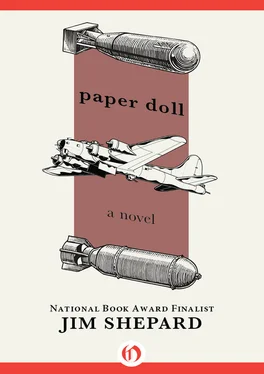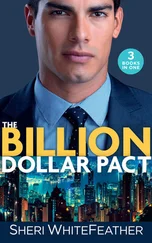They were comforted with the next sheet, a navigator turning rather quickly, Bryant thought, from his station, NAVIGATOR, it said, calculates estimated position, informs radio operator, destroys papers, picks up maps, compass, and celestial equipment, and goes aft to the radio compartment.
The image went dark again and the men groaned. The light came back on and a pair of small and flustered sergeants began working on the machine.
“Get the same guy who fixed the movie projector,” the earlier heckler called. The crews folded their arms and waited with a martyrish patience, griping about the constant snafus and trapped until the whole strip could be shown.
Bean and Snowberry argued about the Conn-Louis fight. Bean had admitted to everyone who would listen that he’d blown “over twenty dollars” on the fluke of Billy’s having “walked into that left in the thirteenth.”
“Two years and this geep is still moaning about it,” Snowberry groaned. “Bryant’s the mick. He’s the one should be yapping.”
“Conn won the fight,” Bean asserted. “He was ahead 7-4-1 on one card coming out for the thirteenth.”
“Yeah but he got knocked out,” Piacenti said. “Lights out. Capisce? ”
“Nobody beats Joe Louis,” Snowberry said. “Joe Louis goes bear hunting with a switch.”
An image flashed before them of a bombardier taking aim at his bombsight with his pistol, like a cowboy ruefully dispatching his injured horse, and then it disappeared.
“Twenty dollars,” Bean said miserably. “I never bet money. It was a sure thing.”
“War,” Hirsch said, gazing at the huddled repair attempt going on around the machine, “has got to be one of the most boring of human activities.”
The strip resumed and they quieted down, becoming more than a little interested in ensuring that they knew the ways out of a sinking B-17.
At mess Bryant and Snowberry flanked Bean, and Piacenti sat opposite. “You remind me of Peter Lorre, Bean,” Snowberry said. “Except he has nicer eyes.”
“Why don’t you keep quiet?” Bean asked. “And then I could eat in peace. I’m tired of everyone always picking on me.”
“Cream chipped beef,” Piacenti said grimly. “Don’t you just love cream chipped beef? Me, I could eat it all the time.”
“Why isn’t the food as good as it was in Basic Training?” Snowberry asked. “Why is that?”
No one had any ideas.
“I don’t know,” Bean said, chewing. Every so often one of the beef strips didn’t give up so easily. “I didn’t really have Basic.”
“You didn’t have Basic?”
“No,” Bean said, a little cowed. “I got sent to the wrong post because of a typographical mistake. Me and about ninety other guys. The master sergeant didn’t know what to do with us, since we weren’t supposed to be there in the first place, so he had us on kitchen and latrine detail. We never got Basic, and I know I never complained. One day he took us out into the field and showed us his rifle.”
“Showed you his rifle,” Piacenti said.
“You know, the breech, and loading it, and shouldering it, and all that.”
“Are you telling us you only fired a rifle once?” Piacenti asked.
“Well, we didn’t get to fire it.” Bean took the beef from his mouth and laid it in a strip alongside others next to his plate. “Because then we would have had to use the range and he would have had to explain why and all that.”
“Oh, sure,” Snowberry said.
“Anyway, he put it on our record that we had Basic Training because of that, but I don’t think we did.”
“No, I don’t think so,” Snowberry agreed.
“I’d appreciate it if you didn’t tell Lewis that story,” Bean said, after they had been silent a moment.
“You don’t have a thing to worry about there,” Bryant said.
On their leave, they hitched a ride with Army Supply as far as a sleepy crossroads Robin had stipulated and jumped down and gave the drivers the high sign. They stood awkwardly in the sun while the trucks labored and clamored down the curving lane like an embodiment of their own awkward intrusion into the countryside. They were both eager and happy, and took turns pushing each other out of the shade of a reedy beech tree. Snowberry compared the wonders of the upcoming trip to the World’s Fair, but Bryant did not carry the joke any farther. They had together that morning gone to the PX and asked the tech sergeant behind the barred window of the pharmacy for boxes of condoms. He had wished them happy flying.
“Aren’t you horny?” Snowberry asked. “I’m horny.”
Bryant blushed and let on as how this was all pretty old stuff as far as he was concerned. He fingered the package in his breast pocket, amazed that all of this was happening to him.
Snowberry pointed at Robin and Jean, pedaling toward them on ancient red bicycles and raising a low cloud of dust incongruous with their pace. “Here’s our World of Tomorrow,” Snowberry joked, and Bryant held up a hand in greeting, like a happy Indian, he thought.
It was the beginning of a forty-eight-hour pass. Snowberry and Bryant, thanks to the largesse of Robin Lea and her mother, Elizabeth, were going to enjoy what was for the aircrews one of the more coveted of the officially sanctioned activities: dinner at an English home. Dinner, short-rationed or not, in a setting in some way certain to relieve the sense of being in the service, and the war.
They hugged formally, the girls leaning forward with a cautious hand on their bicycles. Then they walked back the way the girls had come, slipping into single file when the occasional military transport passed. “Hubba! Hubba!” one dope called from the back of a Willys.
“That really burns me,” Bryant was going to say, but Robin turned to him and smiled, unconcerned.
The sky was blue and clear and free of the sounds of engines. Robin and Jean were politely happy but also a little jittery and hardly overwhelmed and Bryant wondered if they wondered if they’d done the right thing. He tried to exchange worried or even wounded glances with Snowberry, but his buddy was still cocking his head around, taking in the sights.
At the cottage Elizabeth Lea stood shooing geese. She held a hemp doormat at arm’s length and beat it with what looked like a small hoe. She met them at the iron garden gate, repeating their names as she took their hands in a way that was both warm and businesslike, so that Bryant felt both grateful and excluded. She was a thin woman with a posture like a question mark who somehow managed to convey the impression of standing straightbacked with dignity.
There were more, borrowed, bicycles alongside a shed black with creosote — Bryant was heartened to think of the work that must have gone into Robin and Jean’s assembly of four bicycles for the afternoon — and the plan was to drop off their things, and tour the countryside as their first activity. They were to go straight inside, Robin directed, and change into their bathing trunks.
They rode out onto the lane in a shaky cluster, Bryant having all kinds of trouble with his bicycle (“Mine’s defective,” he kept calling, to the girls’ delight), the chain slipping disastrously on the sprocket teeth every few revolutions. He was forced to work twice as hard to keep up, but looked up and beamed sweatily whenever they sent a questioning glance back.
They passed a chemist with a kelly green sign, a baker’s window with golden and glazed buns. The huddled windows and doors and forehead-low roofs all seemed to him vaguely reminiscent of children’s books. They rode through lanes shaded bottle green by overhanging trees, one of which Robin would occasionally single out as particularly old. “She’s showing us trees?” Snowberry said as an aside at one point. Bryant kept his eyes on her back, rising and falling gently with the action of the pedals, damp enough now across the delicate wings of the shoulder blades that her blouse was clinging, and he focused on the simple pleasure he derived from that, as they soared down through curves, passing through shaded breezes that cooled his forehead. The leaves on the trees above them turned with the wind like schools of fish.
Читать дальше












